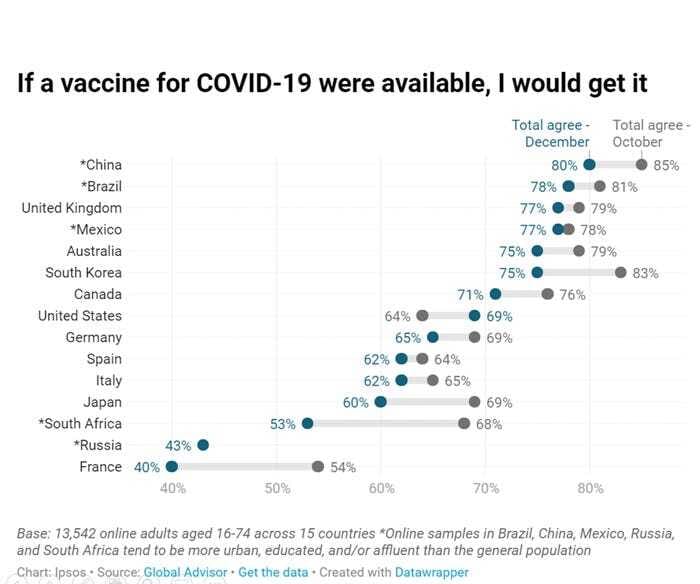I keep seeing references that suggest we’re on the downhill slide with the coronavirus pandemic. I think this is dangerous nonsense. That some vaccines have received approval in different places, and people have started receiving these vaccines, are surely steps in the right direction. That said, we need a sanity check.

Fewer than 10 million doses have been administered, and most of the vaccines require two doses, so we’ve had around the equivalent of 5 million people vaccinated out of 7.8 billion. It’s a nice start, but we’re talking about .06% of the global population. Individually, Israel (9.2%), Bahrain (3.4%), and the UK (1.4%) are the only has nations reporting that they have delivered one dose of vaccine to at least 1% of its people. (Again, most of the vaccines need two doses, so divide those percentages by two.)
The Trump administration pledged to have over 20 million citizens protected by the end of the year, but it barely managed 10% of that goal. That sparked analysis that estimated it would take a decade for the US to get where it needed to be if it doesn’t pick up the pace, and Operation Warp Speed’s goal of 80% coverage by late June seems quite optimistic. That said, the federal government recently reached agreements with multiple pharmacy chains, including 40,000 locations around the country. Once those are on board, the rollout should pick up the pace considerably. It’s just a bit hard to see why such agreements weren’t taken care of prior to the approvals.

The question now is how many of us need to be vaccinated to reach ‘herd immunity,’ the point where few enough people are susceptible in a community that the disease dies out for lack of hosts. Scientific estimates vary, but the consensus seems to be around 60-70%. Given that, we are a long way from putting the pandemic in the rearview. Current infection rates support this conclusion. In the US, the number of people hospitalized with COVID-19 is higher now than at any point in the pandemic, and the UK is on a similar trajectory.
Worse yet, there’s a major variant of the virus that was discovered in the UK. Today, Science published an article about that variant with a worrisome headline.

The new variant has multiple mutations, which will take time to study. For now, it appears the variant may be more readily transmissible, and it’s possible the mutations “might lead to more severe disease or even evade vaccine-induced immunity.”
I should stop here and note that I do not have special training in relevant areas. Given that, as far as discussing the disease itself, I’m being careful to pass along claims from experts in trusted outlets and not provide commentary around things like the potential danger. I’m just trying to point out the fact that the experts are saying this is worth tracking.
With that said, Laurie Garrett is a science writer who has long covered infectious disease outbreaks. She shared the following warning in light of the variant’s discovery and the slower than expected vaccine rollout in the US.
On top of the vaccine rollout challenge, we have the anti-vaccine ‘movement.’ This has been a long-running issue on the margins that may now become a much bigger problem than it has been in the past when a person’s choice not to vaccinate themself or their children was generally a risk they created for themselves. Now, they’re putting us at risk of not being able to reach the levels of immunity necessary to eradicate the disease, which takes us back to Garrett’s warning. We’ll see how people act when they’re offered the vaccine, but some recent polls give rise to concern. Recent US polling suggests around 2/3 of Americans will take the needle, but opinions have been fluctuating. (A different poll had the figure at 51% back in September.) And in many places, public sentiment towards the vaccine is trending in the wrong direction.

Getting back to where I started, I’ve seen plenty of commentary suggesting that we’re turning the corner on the pandemic. I do not think the data agree with that sentiment, and I worry that it risks giving a false sense of security to people who are already exhausted with the pandemic and the demands and concerns it places on our lives. We’ll get there, but we’re not there yet. The better we’re able to remain vigilant, the sooner we’ll be able to kick our feet up again. Here’s hoping the vaccines keep getting approvals, and the global rollout gets into full swing in a hurry.
